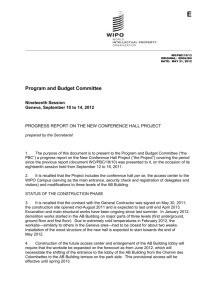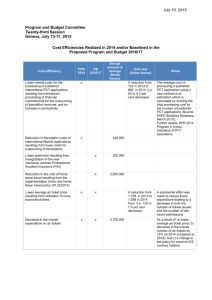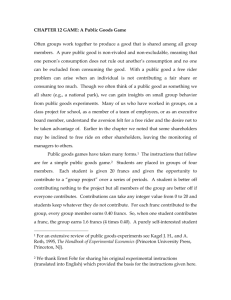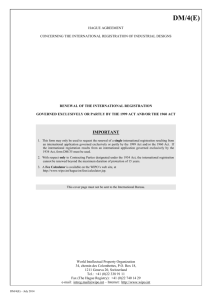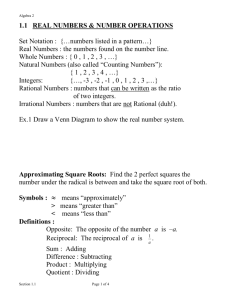part i - administrative and legal provisions
advertisement
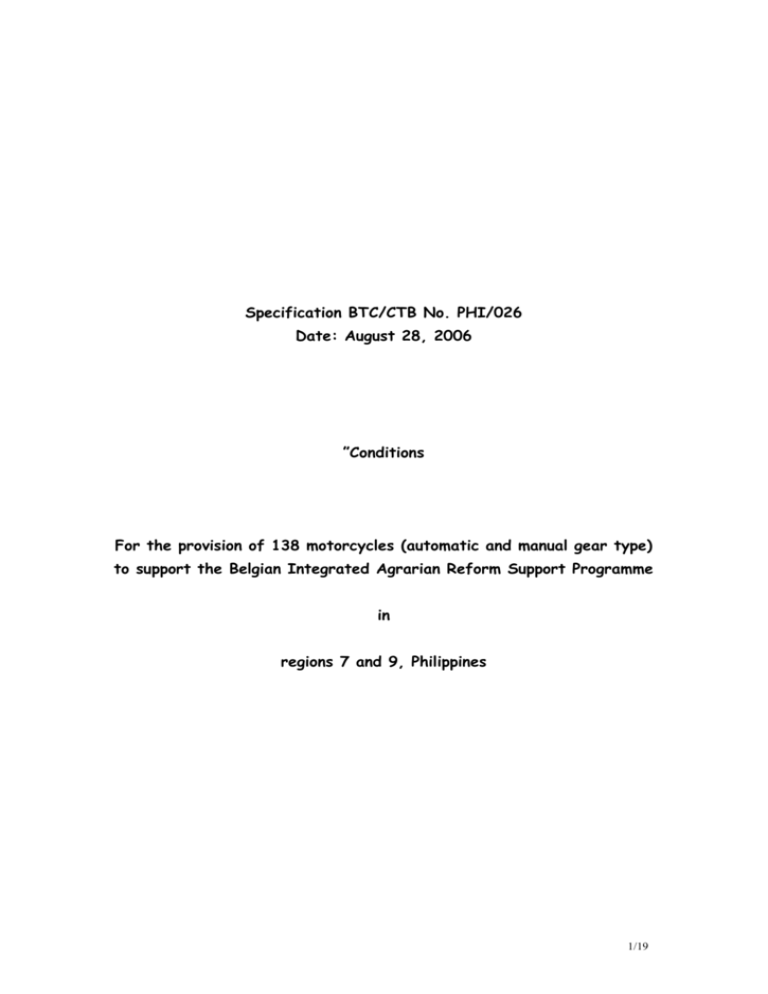
Specification BTC/CTB No. PHI/026 Date: August 28, 2006 ”Conditions For the provision of 138 motorcycles (automatic and manual gear type) to support the Belgian Integrated Agrarian Reform Support Programme in regions 7 and 9, Philippines 1/19 PART I - ADMINISTRATIVE AND LEGAL PROVISIONS Foreword/Introduction With a view to providing capacity support to the staff of the Department of Agrarian Reform (DAR) in 8 provinces in the Philippines, the Belgian Technical Cooperation (BTC), represented by the Chairman of the management committee, Mr. Carl Michiels, who is responsible for day-to-day management, and the contracting authority (see Chapter 1, point 3, Definitions) shall award a contract for the procurement of 138 motorcycles (39 manual and 99 automatic gear type). This contract, authorised by BTC, falls within the scope of European regulations and Belgian legislation on public contracts, in particular the law of 24/12/1993 (Belgian Official Gazette of 22/1/1994) and the relevant regulations (Royal Decrees of 8/1/1996; 26/9/1996; 14/10/1996 and 29/1/1997; published in the Belgian Official Gazette on 26/1/1996; 18/10/1996; 24/10/1996 and 13/2/1997), as amended and valid on the date of this specification. This specification clarifies and/or sets out exceptions to the general contract terms and conditions. Should the specification prove to contain lacunae, mistakes and/or unclear provisions, then the tenderer must point these out and correct them in a separate document, giving the appropriate explanation and describing the ensuing consequences, in particular the financial and technical consequences. In accordance with the specification, in accepting this contract the tenderer waives its conditions. Chapter 1 General 1. Context In accordance with Article 5(1) of the law of 21 December 1998 on the establishment of Belgian Technical Cooperation in the form of a public-law company with social purposes (Belgian Official Gazette of 30/12/1998), BTC has exclusive authority in respect of executing, both inside and outside Belgium, public service tasks in the area of direct bilateral cooperation with partner countries. More specifically, this means that BTC is exclusively responsible for the local implementation of initiatives falling within the scope of direct bilateral cooperation and for the deployment of personnel and resources for realising these initiatives. This includes projects and programmes, financial cooperation, support for micro-companies, grants and work placements. At the request of organisations governed by public law, BTC can also perform other development cooperation missions and develop its own activities that contribute towards realisation of its objectives (cf. Articles 7 and 8 of the aforementioned law). This law took effect on 24/2/1999 (Article 1, Royal Decree of 10/2/1999) and the company's articles of association were published in the Belgian Official Gazette on 27/2/1999. In accordance with Article 15 of the aforementioned law, a management contract was concluded between BTC and the Belgian state (approved by the Royal Decree of 5/5/1999, Belgian Official Gazette of 28/5/1999) that sets out the rules and the special conditions for the implementation of public service tasks. 2/19 2. Object In the framework of ‘Belgian Integrated Agrarian Reform Programme’ (BIARSP) the BTC solicits the interest to deliver for the Institutional Capacity Building component of the BIARSP 138 (one hundred thirty eight) motorcycles in the eight provinces of regions 7 and 9 of the Philippines, as described in Part II ("Technical Specifications"). This tender consists of two types of motorcycles spread over 2 batches. Interested tenderers may bid for one or two batches. Batch 1 76 motorcycles for the provincial and municipal offices of the Department of Agrarian Reform – Region VII (DAR) i.e.22 in Dumaguete (Oriental Negros), 20 in Cebu City (Cebu), 26 in Tagbilaran (Bohol), and 8 in Siquijor (Siquijor) in the Philippines. Batch 2 62 motorcycles for the provincial and municipal offices of the Department of Agrarian Reform – Region IX (DAR) i.e. 24 in Dipolog (Zamboanga del Norte), 10 in Pagadian (Zamboanga del Sur), 14 in Ipil (Zamboanga Sibugay), and 14 in Isabella (Basilan). The Contracting Authority may decide not to pursue this tender and start the process again, if needed using another tendering mode. For this contract the delivery is established at DDP (Incoterms 2000), Dumaguete (Oriental Negros), Cebu City (Cebu), Tagbilaran (Bohol), Siquijor (Siquijor), Dipolog (Zamboanga del Norte), Pagadian (Zamboanga del Sur), Ipil (Zamboanga Sibugay), and Isabella (Basilan). All goods should be free of damage. 3. Applicable legislation : For this contract concluded by BTC, Belgian legislation on public contracts is applicable; namely, the law of 24/12/1993 on public contracts and certain works, supply and service contracts and the related regulation (in particular the Royal Decree of 8/1/1996 on public works, supply and service contracts and public works concessions and that of 26/9/1996 laying down the general rules for the performance of public contracts and public works concessions, to which is annexed the General Contract Terms and Conditions); taking into account any adaptation and as applicable on the date of the present specifications. 4. Derogations from the General Contract Terms and Conditions In application of Art. 3(1) of the Royal Decree of 26 September 1996, below is a list of provisions from which these specifications derogate: 5. Reasons for the derogations from the General Contract Terms and Conditions 6.1 Art. 14. As a derogation from Article 14(1) of the General Contract Terms and Conditions the purchase prices of any patent rights, as well as compensation for any patent licences and for maintaining patents, are borne by the contractor, irrespective of whether or not their existence is mentioned in these specifications. 6.2 Art. 15(3). 3/19 There is derogation from Article 15, Para. 3 of the General Contract Terms and Conditions to prevent BTC incurring an unavoidable financial risk resulting from an insufficiently specific court ruling on an attachment order. 6.3 Art. 69. If, under the terms of the specifications, the services to be provided are fixed or include minimum amounts, the service provider does not acquire, by the sole fact of conclusion of the contract, the right to compensation for the injury it suffers, if the fixed or minimum quantities are reduced for reasons for which BTC is not wholly liable. 6. General conditions The general contract terms and conditions shall apply, unless expressly stated otherwise in this specification. 4.1. Bank Guarantee (Article 5, general contract terms and conditions) In accordance with Article 5 of the general contract terms and conditions no bank guarantee is required as the delivery time is set to be within 30 days. 4.2. Intellectual rights Intellectual rights are paid upon provision of documentary evidence showing that such rights have been lawfully obtained or established. 4.3 Warranty (Article 63, general contract terms and conditions) The warranty shall have duration of minimum one year as from the date of the signature of the provisional delivery and shall cover spare parts and working hours. More in detail, it should guarantee that: Original pieces have been used during the assembly; The goods are free of any defect at the time of their delivery; Goods that show any defect within 30 calendar days after delivery will be replaced; Goods showing a defect after 30 calendar days because of assembly errors will be repaired by the supplier or its service points; For repaired items a new guarantee period of one year will be observed. 7. Performance guarantee The tenderer will include a performance guarantee in its offer or proposal, i.e. it will take all steps necessary to carry out the contract and to achieve the results described in this specification. Should the specifications prove to contain lacunae, mistakes and/or unclear provisions, then the tenderer must point these out and correct them in a separate document, giving the appropriate explanation and describing the ensuing consequences, in particular the financial and technical consequences. 8. Applicable law, jurisdiction, conditions This contract and all legal consequence that might ensue fall fully within the scope of Belgian law. The courts of Brussels shall have sole jurisdiction. In accordance with the specification, in accepting this contract the tenderer waives its (sales) conditions. Given the award procedure, the contracting authority has no possibility to negotiate the clauses of the present specifications. 9. Technical Specifications 4/19 The Technical Specifications are found in Part II. 10. Definitions The following definitions shall be used for the purposes of this contract: - Tenderer: the party submitting an offer; - Supplier: the tenderer to whom the contract is awarded; - Contracting authority: BTC, represented by Mr Carl Michiels; - Beneficiary: the Department of Agrarian Reform (DAR). 11. Award procedure This contract is awarded by means of a General Call for Tenders in accordance with Article 13 et seq. of the law of 24/12/1993. 12. Delivery time The contract shall take effect on the date of award, which shall be established by tendering authority and shall expire no later than the 30th calendar day following this date. 13. Variations No variations are foreseen. 14. Options No compulsory options are foreseen. 5/19 Chapter 2 Procedure 1. Information For more information, you may contact Peter D’Huys, Belgian Programme Coordinator (+35.225.59.29) or Anne Dedeurwaerdere, Belgian Technical Cooperation in writing for a period of 30 calendar days as from the announcement of this tender. Letters must be sent to one of the addresses given in Chapter 6, point 2. 2. Submission of offers 2.1 Offers shall be submitted in English, Dutch or French (technical annexes may be written in English if no translation exists), in accordance with the model appended as Annex 1 to this specification; if this model cannot be used, then the tenderer shall declare on each document that the document conforms to the specification’s specimen offer (Article 89, Royal Decree of 8/1/96). 2.2 Offers shall be sent to BTC in the Philippines at the address given in Chapter 6, point 2, in a sealed envelope on which the following is written: “TENDER MOTORCYCLES”, the opening date of the offers and the number of this specification (PHI/026). 2.3 An electronic version of the offer is to be included in the submission of offer. 2.4 Offers must be received by no later than September 4, 2006 at 10.00 am. They may be sent by registered letter or delivered by messenger against receipt; 2.5 The offer and all documents pertaining thereto must be numbered and signed by the tenderer or its authorised representative. The same applies to overwritten text, deletions or annotations made thereto (Article 89 of the Royal Decree of 8/1/1996). The authorised representative must establish that he is authorised to bind the tenderer. 3. Opening of the offers The offers submitted for this contract shall be opened at a public session on September 4, 2006 at 11.00 am. at BIARSP TSCO, 2/F Sol y Mar Building, Rizal Boulevard corner San Juan Street, Dumaguete City, 6200 Oriental Negros, Philippines (the address given in Chapter 6, point 2). 4. Selection Criteria Only the legal regular bids with all their annexes will be considered. In view of art. 42 of the RD 08-01-1996, the contracting authority will, prior to the awarding, initiate a qualitative selection of the tenderers on the basis of the following documentary evidence: Art. 42 states that the contracting authority may initiate a qualitative selection of the tenderers after having obtained information on the situation of each supplier and the documents that are necessary to evaluate the financial, economic and technical minimum criteria as according articles 43 to 46. The tenderer may not be subject to the exclusion criteria of art. 43 and 43 bis, RD 8.1.1996. Art. 45: Documents that should indicate the technical capacity of the supplier. - List of the most important deliveries made during the last 3 years indicating the amount, date and public or private authority for which they were intended; - List of dealers in region VII and IX in the Philippines; 6/19 - Description of the goods to be delivered; Certificates with reference to the technical specifications. - Certificate that the tenderer has fulfilled all fiscal obligations to the authority of the country of residence; Warranty conditions for the goods to be supplied. - 5. Methodology Only those offers that are in order and include all the relevant annexes will be considered. The award criteria on the basis of which the offers will be ranked and rated are the following: The total price of the tender per batch – 40% Comparative independent rating – 25% (Overall safety; overall quality; overall dependability) Services Points (number of provinces) – 10% Variables – 25% (performance; torque; fuel consumption; comfort features; warranty; options free-of-charge) 6. Price inquiry Prior to the awarding of the contract the tenderers must supply all necessary information so that BTC can undertake a price inquiry (Article 88 of the aforementioned Royal Decree), irrespective of the amount of the contract or the way in which the contract is awarded. 7/19 Chapter 3 Prices, methods of payment and guarantee 1. Prices The agreement to be concluded concerns a global contract for each batch that is valid for the entire duration of the project. The total price for the goods is calculated on the basis of the given unit prices expressed in Euros, free of taxes and import duties. The price includes the goods, their packaging and transportation to their destinations. Conform the Specific Agreement between the Kingdom of Belgium and the Republic of the Philippines, At. IV.10 “the Government of the Philippines shall bear all costs off al taxes including value-added taxes, for all goods, equipment and services that are needed for the implementation of the programme and that will be acquired with Belgian funds on the local market.” Therefore, the price given is exclusive of VAT. Conform the Specific Agreement between the Kingdom of Belgium and the Republic of the Philippines, At. IV.10 “the Government of the Philippines shall bear all costs such as custom duties, storage fees, custom clearance costs, and all other costs in the importation of goods and equipment for the programme to be acquired with Belgian funds.” 1.1 Price review The prices are fixed and not subject to review. 2. Period during which the tenderer is bound to keep open his offer In accordance with Article 116 of the Royal Decree of 8/1/1996 the tenderers are bound by their offer for a period of 90 calendar days starting on the day after the session where the offers are opened. 3. Payment Payment will be made – in Philippine Peso or € - on the basis of invoices sent to the address of the BTC representation in the Philippines. This address is given in point 2 of Chapter 6. The bank exchange rate of the Bank of Philippine Islands (BPI) of the date of payment will be used to define the exchange value. These invoices will be signed and dated and will include the following statement: "hereby declared authentic and true the total sum of €. .... (written out in full)". The tenderer may not request an advance payment. Payments shall be effected in accordance with stages or the progress report which must be clearly specified in the contract. In the event of a refusal to pay or in the event that a seizure order is served upon BTC due to circumstances relating to the supplier, and in so far as the exact and definitive amount of these sums are not set, BTC shall be entitled to suspend all payments to the aforementioned supplier. BTC shall have 15 calendar days to effect payment of the sums due to the supplier as from the date that opposition or seizure order is lifted. The BTC representative's prior approval of invoices is required before BTC can effect payment thereof. 4. Bank Deposit In accordance with Article 5 of the general contract terms and conditions no bank deposit is required. 8/19 Chapter 4 Execution of the contract 1. Implementation of the contract The supplier of the training services is expected to deliver one or two batches of hundred thirty eight (138) motorcycles to various locations in the Philippines according to the specifications in Part II. 2. Penalties for late completion Penalties for late completion are due, without notice, once the deadline has elapsed; notice does not need to be served. They will be automatically applied for the total number of calendar days of the delay. They will be calculated in accordance with Art. 66. of the general contract terms and conditions, appended to the Royal Decree of 26/9/96. Chapter 5 Deliveries The general conditions of contract are applicable. 1. Final delivery Final delivery will take place after the expiry of the warranty period set at 30 calendar days. The BIARSP Coordinator – or his representative - assisted by the regional DAR Director – or his/her representative - will inspect and receive the goods for final delivery. Chapter 6 Miscellaneous 1. Confidentiality The supplier and BTC guarantee that the information obtained within the framework of this contract shall remain confidential and that it will only be divulged to third parties after receiving the prior written consent of the other party. The supplier and BTC will only distribute this confidential information among appointed parties involved in the contract. They guarantee that said appointed parties will be adequately informed of their obligations in respect of the confidential nature of the information and that they will comply therewith. 2. Additional information Additional information can be obtained from the Belgian Technical Cooperation offices in Belgium or in the Philippines from the following addresses: BTC-Brussels, Hoogstraat, 147, 1000 Brussels, Belgium (tel. +32.2.505.37.00, fax. +32.2.502.98.62) C/o Ann DeDeurwaerdere (direct tel. +32.2.505.37.32) e-mail: : ann.dedeurwaerdere@btcctb.org 9/19 BTC Philippines, BIARSP TSCO, 2/F Sol y Mar Building, Rizal Boulevard corner San Juan Street, Dumaguete City, Oriental Negros 6200, Philippines. (tel. +63-35-2255929 to 30, +63-35-4227459, fax. +63-35-4227736) c/o: Peter D’HUYS (coordinator@biarsp.org) who will also supervise the execution of the contract. 10/19 PART II - TECHNICAL SPECIFICATIONS Motorbike Specifications Type A. 4-stroke engine, single cylinder, 125-175 CC, 4-5 gears, manual clutch type, with central beam frame (fuel tank mounted on top of frame in front of seat) Helmet Type B. 4-stroke engine, single cylinder, 100-125 CC, 4 gears, automatic clutch type, with low mounting frame (fuel tank underneath seat) Helmet In connection to the warranty, an official dealer network for maintenance and repairs is to be available in the regions where the final delivery will take place i.e. region 7 and /or 9 of the Philippines. 11/19 Destinations: Batch 1 Description Unit Contact Person Grace Fua PARO Motorbike TYPE B 22 Motorbike TYPE B 26 Atty. Johnson Sinco PARO Motorbike TYPE B 18 Motorbike TYPE B 8 Motorbike TYPE B 2 Virgilio Alcomendras PARO Teresita Depeňoso PARO D. Yusuf Mama TOTAL 76 Delivery Address Dept. of Agrarian Reform, Hibbard Ave., Dumaguete City, Neg. Or. 6200 Dept. of Agrarian Reform, Bodare Building, Capitol Complex Annex, Dao District, Tagbilaran City Dept. of Agrarian Reform, 2/F WDC Building, Osmeña Boulevard, Cebu City Dept. of Agrarian Reform, PAC Building, Brgy. Caipilan, Siquijor, Siquijor Dept. of Agrarian Reform Region 7, 2/F Cebu Capitol Commercial Complex, Escario St., Cebu City Telephone Number 035-2251586 038-2354243 032-2557138 035-4803072 032-2536913 Batch 2 Description Unit Motorbike TYPE A Motorbike TYPE B 13 11 Motorbike TYPE A Motorbike TYPE B 7 3 Motorbike TYPE A Motorbike TYPE B 7 7 Motorbike TYPE A Motorbike TYPE B 12 2 TOTAL 62 Contact Person Rogelio Balladares PARO Raymundo Bernardo PARO OIC Raymundo J. Alexis Edades PARO Suwaib Ismael PARO Delivery Address Dept. of Agrarian Reform, BLISS, Sta. Isabel St., Dipolog City, Zamboanga del Norte Dept. of Agrarian Reform, F.S. Fajares St., Pagadian City, Zamboanga del Sur Dept. of Agrarian Reform, Ipil Heights, Ipil, Zamboanga Sibugay Dept. of Agrarian Reform, Tabuk, Isabela, Basilan Telephone Number 065-2127445 062-2143464 062-3335529 062-2003319 12/19 ANNEX I MODEL FOR TENDER Firm …………………………………………………… (company name, legal form) with its registered office at ………………………… (municipality, street, number), represented by the undersigned…………………………….. hereby agrees to …………….. for the BTC……………., in accordance with the clauses and conditions of the specifications, ref. ……, of which a proposal, supplemented with a methodological statement, is appended hereto, for a total price, excluding VAT, of …………………….. € (in figures and in words). It declares that it has read and approved the specifications ref. BTC no. PHI/026 It holds a post office account ……………or a bank account nr………… at ………………. Its VAT number is the following one ……………………… Its registration number in the trade register is the following one ……………………… It is registered with the National Social Security Office under number ……………………and certifies that it is up-to-date in the payment of its social security taxes (Art. 90(3), RD 8.1.1996). Done in duplicate at ………….., on Signature(s) and title(s). 13/19 ANNEX 2 BILL OF QUANTITY ALL PRICES without VAT and import taxes Item Description 1 Batch 1: 2 Batch 2: Par. Qty. Unit Price Total GRAND TOTAL Grand Total in EURO: 14/19 ANNEX 3 INVENTORY OF DOCUMENTS No 1. 2. 3. 4. 5. 6. Main documents Introduction letter (Annex I) Inventory of documents (annex III) Pro forma Invoice Main proposal Options, if any (Annex IV) List of certificates Total number of pages # pages Attachments Attachments need to dated, signed and bear a seal of the tenderer 15/19 ANNEX 4 PROPOSED OPTIONS FREE-OF-CHARGE Details on proposed options: - 16/19 ANNEX 5 CONVENTION ON COMBATING BRIBERY OF FOREIGN PUBLIC OFFICIALS IN INTERNATIONAL BUSINESS TRANSACTIONS Belgium ratified this convention and transposed it into its national legislation in the form of the law of 10 February 1999 on the suppression of corruption. For information purposes, below you will find several key provisions of this text, largely excerpted from the Criminal Code and the Code of Criminal Procedure. Articles 240 to 243 of the Criminal Code are written as follows: Art. 240. Any person exercising a public function who has misappropriated public or private funds, securities in lieu thereof, documents, securities, records, or movable property which were in his hands either by virtue of or by reason of his function shall be punished by imprisonment for five years to 10 years and a fine of 500 francs to 100,000 francs. Art. 241. Any person exercising a public function who has maliciously or fraudulently destroyed or deleted records or securities of which he was the depositary in this capacity, which had been communicated to him, or to which he had access by reason of his function shall be punished by imprisonment for five years to 10 years and a fine of 500 francs to 100,000 francs. Art. 242. When a person has deleted or destroyed documents or records of judicial proceedings, or other papers, registers, computer or magnetic media, records or effects contained in the public archives, registries or filings, or given to a public depositary in this capacity, the depositary guilty of negligence shall be punished by either or both of imprisonment for one month to six months or a fine of 100 francs to 10,000 francs. Art. 243. Any person exercising a public function who is found guilty of misappropriation, by ordering to pay, demanding or receiving what he knew was not due to him or exceeding what was due for fees, taxes, contributions, funds, revenue or interest, for wages or salaries, shall be punished by either or both of imprisonment for six months to five years or a fine of 100 francs to 50,000 francs, and can also be sentenced to prohibition of the right to fulfil public functions, jobs or offices, in conformity with Article 33. The sentence shall be imprisonment for five years to 10 years and a fine of 500 francs to 100,000 francs if the misappropriation was committed with the use of violence or threats. » Article 245 of the same Code is written as follows: "Art. 245. Any person exercising a public function who, either directly, or through other persons, or by bogus deeds shall have taken or received any interest whatsoever in the acts, adjudications, undertakings or state-owned companies which he managed or supervised, in whole or in part, at the time of the act, or who, being assigned to organise the payment or effect the settlement of an affair, shall have taken any interest in it, shall be punished by either or both of imprisonment for one year to five years or a fine of 100 francs to 50,000 francs, and can also be sentenced to prohibition of the right to fulfil public functions, jobs or offices, in conformity with Article 33. The previous provision shall not be applicable to such person who, because of circumstances, was unable to promote his private interests through his position and who acted openly. » Articles 246 to 252 of the same Code are written as follows: "Article 246.1 For a person who exercises a public function, passive corruption shall consist of soliciting or accepting, directly or through other persons, an offer, promise or benefit of any kind, for himself or a third party, to act in one of the ways referred to in Article 247. 2. Active corruption consists of proposing, directly or through other persons, to a person exercising a public function an offer, promise or benefit of any kind, for himself or a third party, to act in one of the ways referred to in Article 247. 3. A person exercising a public function within the meaning of this article is any person who has stood as a candidate for such a function, who gives the impression he will exercise such a function, or who, by misrepresenting his position, gives the impression he exercises such a function. Art. 247.1 When the purpose of the corruption is to have the person who exercises a public function perform an act of his function, which is legitimate but not subject to payment of salary, the sentence shall be either or both of imprisonment for six months to one year or a fine of 100 francs to 10,000 francs. 17/19 When, in the case referred to in the previous paragraph, the solicitation referred to in Article 246.1 is followed by a proposal referred to in Article 246.2, as in the case where the proposal referred to in Article 246.2 is accepted, the sentence shall be either or both of imprisonment for six months to two years or a fine of 100 francs to 25,000 francs. 2. When the purpose of the corruption is to have the person who exercises a public function perform a wrongful act in the performance of his function or to refrain from performing an act that would be part of his duties, the sentence shall be imprisonment for six months to two years and a fine of 100 francs to 25,000 francs. When, in the case referred to in the previous paragraph, the solicitation referred to in Article 246.1 is followed by a proposal referred to in Article 246.2, as in the case where the proposal referred to in Article 246.2 is accepted, the sentence shall be imprisonment for six months to three years and a fine of 100 francs to 50,000 francs. In the event the person corrupted has performed the wrongful act or has refrained from performing an act that would be part of his duties, he shall be punished by imprisonment for six months to five years and a fine of 100 francs to 75,000 francs. 3. When the purpose of the corruption is to have the person who exercises a public function commit a criminal offence or petty offence in the performance of his function, the sentence shall be imprisonment to six months to three years and a fine of 100 francs to 50,000 francs. When, in the case referred to in the previous paragraph, the solicitation referred to in Article 246.1 is followed by a proposal referred to in Article 246.2, as in the case where the proposal referred to in Article 246.2 is accepted, the sentence shall be imprisonment for two years to five years and a fine of 500 francs to 100,000 francs. 4. When the purpose of the corruption is to have the person who exercises a public function use the real or assumed influence he enjoys by virtue of his function to obtain an act by a public authority or administration or to have it refrain from such an act, the sentence shall be imprisonment for six months to one year and a fine of 100 francs to 10,000 francs. When, in the case referred to in the previous paragraph, the solicitation referred to in Article 246.1 is followed by a proposal referred to in Article 246.2, as in the case where the proposal referred to in Article 246.2 is accepted, the sentence shall be imprisonment for six months to two years and a fine of 100 francs to 25.000 francs. If the person corrupted has actually used the influence he enjoys by virtue of his function, he shall be punished by imprisonment for six months to three years and a fine of 100 francs to 50,000 francs. Art. 248. When the actions referred to in Articles 246 and 247, Paras. 1 to 3, are aimed at a police official, a person with the status of officer of the judicial police or a member of a public ministry, the maximum sentence shall be increased to double the maximum of the sentence provided by Article 247 for such actions. Art. 249.1. When the corruption referred to in Article 246 concerns an arbitrator and involves an action falling under his judicial function, the sentence shall be imprisonment for one year to three years and a fine of 100 francs to 50,000 francs. When, in the case referred to in the previous paragraph, the solicitation referred to in Article 246.1 is followed by a proposal referred to in Article 246.2, as in the case where the proposal referred to in Article 246.2 is accepted, the sentence shall be imprisonment for two years to five years and a fine of 500 francs to 100,000 francs. 2. When the corruption referred to in Article 246 concerns a non-presiding judge or juror and involves an action falling under his judicial function, the sentence shall be imprisonment for two years to five years and a fine of 500 francs to 100,000 francs. When, in the case referred to in the previous paragraph, the solicitation referred to in Article 246.1 is followed by a proposal referred to in Article 246.2, as in the case where the proposal referred to in Article 246.2 is accepted, the sentence shall be imprisonment for five years to ten years and a fine of 500 francs to 100,000 francs. 3. When the corruption referred to in Article 246 concerns a judge and involves an action falling under his judicial function, the sentence shall be imprisonment for five years to ten years and a fine of 500 francs to 100,000 francs. When, in the case referred to in the previous paragraph, the solicitation referred to in Article 246.1 is followed by a proposal referred to in Article 246.2, as in the case where the proposal referred to in Article 18/19 246.2 is accepted, the sentence shall be imprisonment for ten years to fifteen years and a fine of 500 francs to 100,000 francs. Art. 250.1. When the corruption referred to by Articles 246 to 249 concerns a person who exercises a public function in a foreign state, the sentences shall be those provided by these provisions. 2. The status of a person exercising a public function in another State shall be assessed in conformity with the law of the State in which the person exercises this function. If it is a State, which is not a member of the European Union, this status is only recognised, for the purposes of application of Para. 1, if the function concerned is also considered a public function under Belgian law. Art. 251.1. When the corruption referred to by Articles 246 to 249 concerns a person who exercises a public function in an organisation under public international law, the sentences shall be those provided by these provisions. 2. The status of this person shall be assessed in conformity with the statutes of the organisation under public international law to which he is subject. Art. 252. Without prejudice to the application of Articles 31 and 32, the persons punished under the provisions of this chapter can also be sentenced to prohibition in conformity with Article 33.” Articles 504a and 504b of the same Code are written as follows: "Art. 504a.1. For a person with the status of administrator or manager of a legal person, authorised representative or employee of a legal or natural person, private passive corruption shall consist of soliciting or accepting, directly or through other persons, an offer, promise or benefit of any kind, for himself or for a third party, to perform or refrain from performing an action of his function or facilitated by his function, without the knowledge or authorisation, as the case may be, of the executive board or general assembly, the principal or the employer. 2. Active private corruption shall consist of proposing, directly or through other persons, to a person with the status of administrator or manager of a legal person, authorised representative or employee of a legal or natural person, an offer, promise or benefit of any kind, for himself or for a third party, to perform or refrain from performing an action of his function or facilitated by his function, without the knowledge or authorisation, as the case may be, of the executive board or general assembly, the principal or the employer. Art. 504b.1. In the case of private corruption, the sentence shall be either or both of imprisonment for six months to two years or a fine of 100 francs to 10,000 francs. 2. In the event the solicitation referred to in Article 504a.1 is followed by a proposal referred to in Article 504a.2, as in the case where a proposal referred to in Article 504a.2 is accepted, the sentence shall be either or both of imprisonment for six months to three years or a fine of 100 francs to 50,000 francs. In the Code of Criminal Procedure, Article 10c is written as follows: "Article 10c. Any person can be prosecuted in Belgium who has committed outside the territory: 1. an offence provided for in Articles 246 to 249 of the Criminal Code; 2. an offence provided for in Article 250 of the Criminal Code when it concerns a person who exercises a public function in a Member State of the European Union. In this latter case, the prosecution can only take place on the official advice given to the Belgian authority by the authority of this State; 3. an offence provided for in Article 250 of the Criminal Code when it concerns a person who exercises a public function in a foreign State other than those referred to in 2. In this latter case, prosecution is subject to the condition that the act is punished by the legislation of the country where it was committed, and inasmuch as the legislation of this State also punishes corruption that involves a person who exercises a public function in Belgium. Furthermore, it can only take place on the official advice given to the Belgian authority by the authority of this State; 4. an offence provided for by Article 251 of the Criminal Code, when it concerns a person who exercises a public function in one of the institutions of the European Union; 5. an offence provided for by Article 251 of the Criminal Code, when it concerns a person who exercises a public function in an organisation of international public law. In this latter case, the prosecution can only take place on the official advice given to the Belgian authority by the competent authority of this organization. " 19/19

